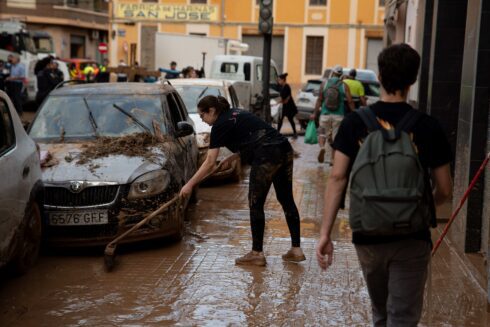LAST week’s flood tragedy in Valencia has exacted a massive financial cost in addition to all of the human pain.
Spain now faces its ‘biggest disaster for a climate event’, said Mirenchu del Valle Schaan, president of the Spanish insurers’ federation UNESPA.
The head of the Valencia Chamber of Commerce, Jose Vicente Morata, said the final bill- purely from a business perspective- would be well above €10 billion.
READ MORE:
- Missing person total revealed as worried family members supply DNA to identify Valencia flood disaster victims
- Deadly flooding in Valencia ‘mostly strengthened’ by climate change, EU report reveals

The central and Valencia regional governments’ finances will be severely stretched, although Spain is seeking aid from the EU solidarity fund that can ease the burden.
On Tuesday, Prime Minister Pedro Sanchez announced a series of measures worth €10.6 billion euros aimed at shielding and relaunching Valencia’s economy.
These included aid to small and medium-sized businesses, self-employed workers, tax relief and a three-month postponement to repayments of loans and mortgages.
Clearing debris and reconstructing obliterated infrastructure will also be financed with the central government, which has estimated those works at €2.6 billion.
An estimated 4,500 businesses located on the ground floors of buildings submerged by mud and water were affected, according to the Valencia Chamber of Commerce.
Dozens of shopping centres and industrial estates home to small and medium-sized businesses were damaged and transport companies lost their lorries.
The flooding of fields dealt a heavy blow to agriculture in the Valencia region.
Regional agricultural trade union La Unio estimates 50,000 hectares of crops were affected.
Agroseguro, which manages Spanish agriculture insurance, believes the cost could rise to 150 million euros in the sector.
Trade union Asaja described the losses as ‘catastrophic’ with ‘incalculable consequences’.
Spanish insurers rely on a common fund managed by the CCS public consortium that shares the cost across the sector in the event of a natural disaster.
The CCS therefore covers most of the compensation and insurers only directly pay out for peripheral damage in areas unaffected by the floods.
The system is ‘perfectly prepared to deal with this type of situation’, said UNESPA head, del Valle Schaan.
More than 72,000 claims have been submitted, said Economy Minister Carlos Cuerpo, with the first payouts expected this week.
There has been criticism already that there are simply not enough people to deal promptly with all the claims.
Click here to read more Valencia News from The Olive Press.








